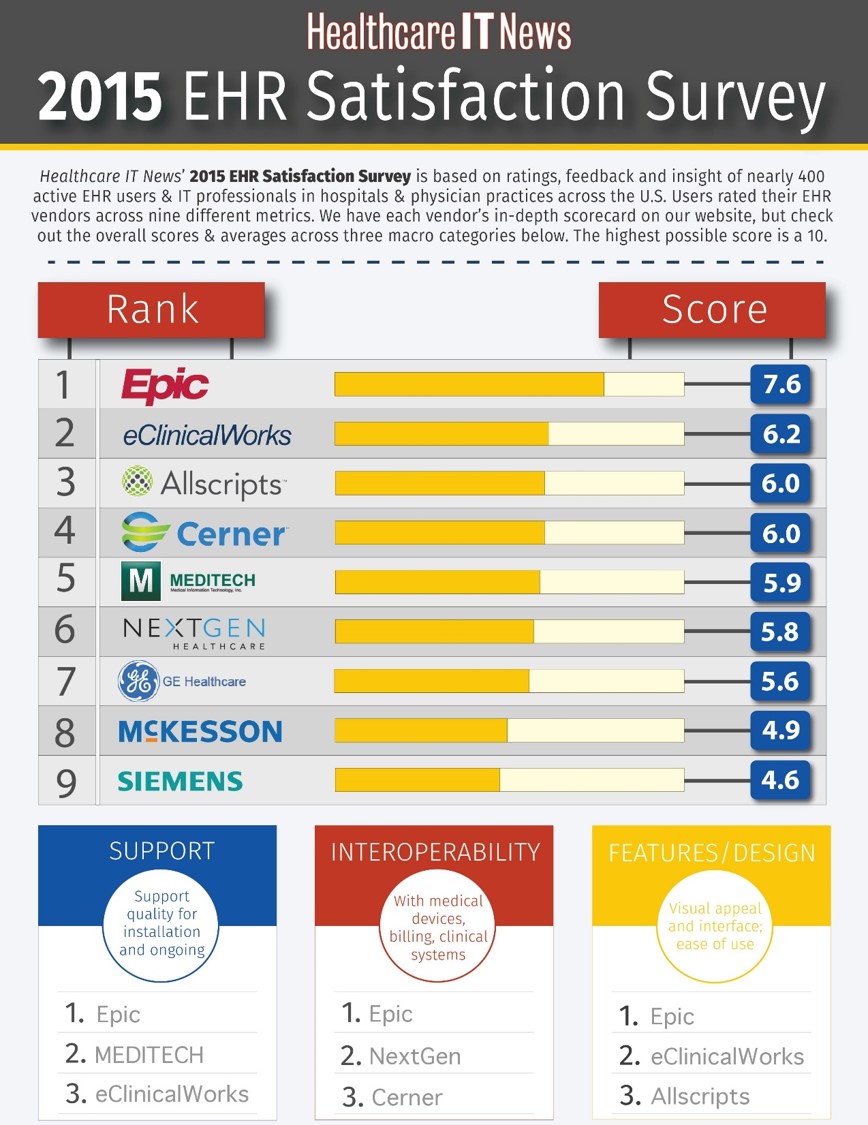EHR satisfaction survey; reading between the lines and thinking about what's next
It was with a bit of my own satisfaction that I read today's HealthcareITNews report on their new user survey of EHR satisfaction. The survey of 396 individual users of 9 major EHR vendors examines metrics of user satisfaction including visual appearance, ease of use, interoperability with medical devices, interoperability with other clinical systems, interoperability with billing systems, quality of installation support, quality of support for ongoing operations, downtime, and overall satisfaction with the product. Some clear leaders, and not always the usual suspects, are identified across the various metrics and summarized in three specific categories of Interoperability, Features/Design, and Support.
As a physician who has dedicated a significant part of his career focusing on Health IT, my satisfaction comes from the fact that overall the industry is improving. Users should expect, in fact, demand that. As the HealthcareITNews survey suggests, electronic health record systems are big-ticket purchases. A hospital or large clinic may spend up to $70,000 per clinician-user for these systems. Such purchases, and particularly when they are poorly implemented, have been the root cause for many executive firings in some hospitals, and even bankruptcies. When you are laying out that kind of dough, you'd better be sure the end result is worth the spend. And that's a vulnerable measure for almost any EHR. Is it worth it?
I'd argue it may not be worth it, but it is certainly necessary. The EHR is foundational to the modernization of the healthcare industry. Without digital data, we'd forever be stuck doing healthcare on paper. We would never be able to really measure what we are doing, to learn from our mistakes, and to apply what we learn toward improving the quality of care. Whether for population health or personalized medicine, digital data is essential to our future.
With digitized health information in place, what are the big opportunities to improve clinical workflow and the quality of care? Four opportunities come to mind that should be on everyone's list:
Mobility--The time has come to untether clinicians from fixed workstations and bulky computers on wheels. Healthcare workers are mobile professionals. They need devices that connect them to information no matter where they are or what they are doing. Organizational leaders need to investigate the newest generation of mobile devices that have been built with the enterprise, and even more-so the end-user, in mind. Smartphones, phablets, tablets, convertibles, laptops and other new-generation devices are exceptional, personal companions for the highly mobile, healthcare professional.
Productivity & Collaboration--Healthcare is as much about communication and collaboration as it is examination and treatment. While the EHR may support examination and treatment, it does little to foster communication between care teams or with our patients. Contemporary universal communications and collaboration technologies must be deployed to bring healthcare professionals the same capabilities that are used throughout most other industry sectors. Likewise, productivity improvements happen when everyone in your organization has access to the messaging, mail, documentation, presentatoin, and sharing solutions that other businesses use every day.
Analytics--Having digital information is one thing, learning from it is another. There are a myriad of new technologies and solutions, including advance business and clinical analytics and machine learning solutions, that will help clinicians prevent errors, personalize treatment, predict outcomes, and improve overall quality. If anything will generate ROI on your EHR investment it is how you deploy and use analytics on all that digital data you are capturing.
Cloud--All of the above solutions can now utilize the cloud to minimize impact on your IT department while offering flexibility, security, scale and cost savings that far surpass on-premise solutions. If you are not strategically moving IT to the cloud, you are missing one of the biggest opportunities in healthcare.
For additional information on how to get more from your EHR investment, please visit us at www.microsoft.com/health .
Bill Crounse, MD Senior Director, Worldwide Health Microsoft

